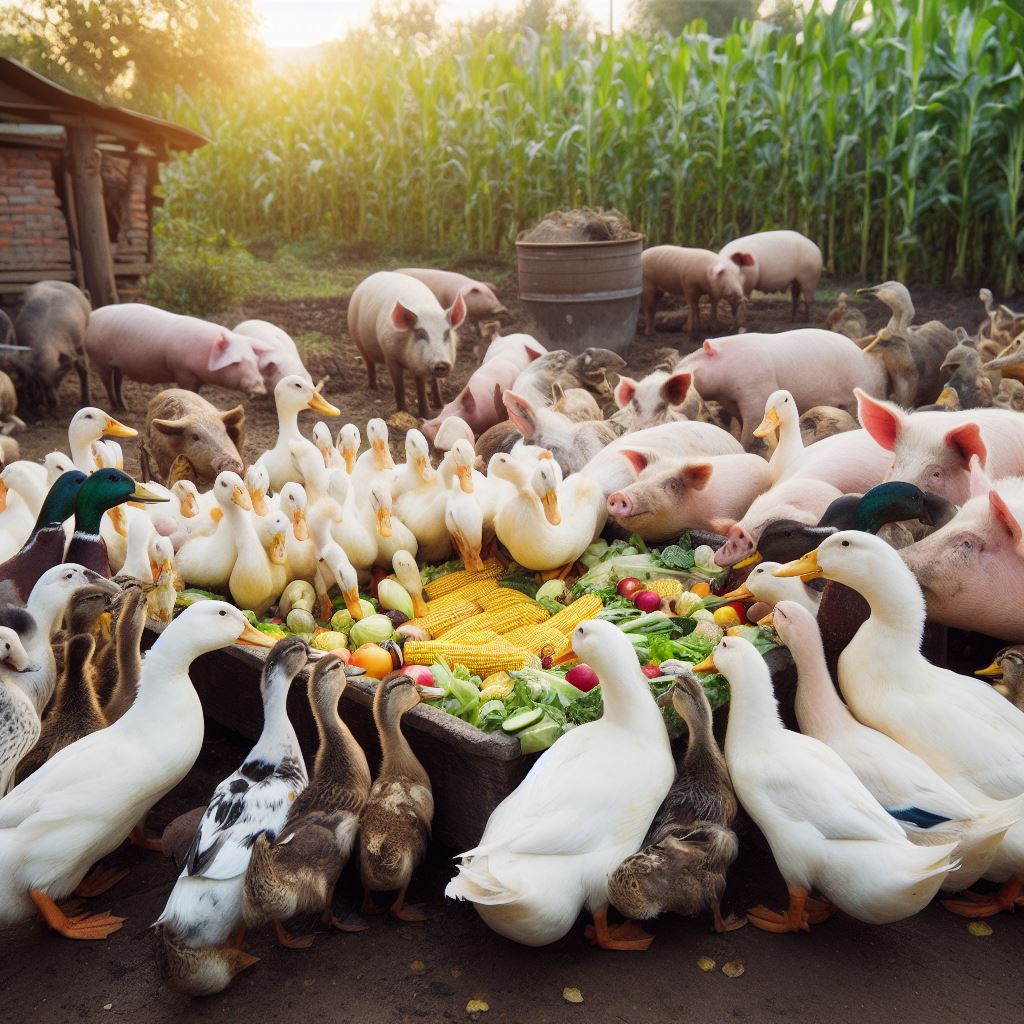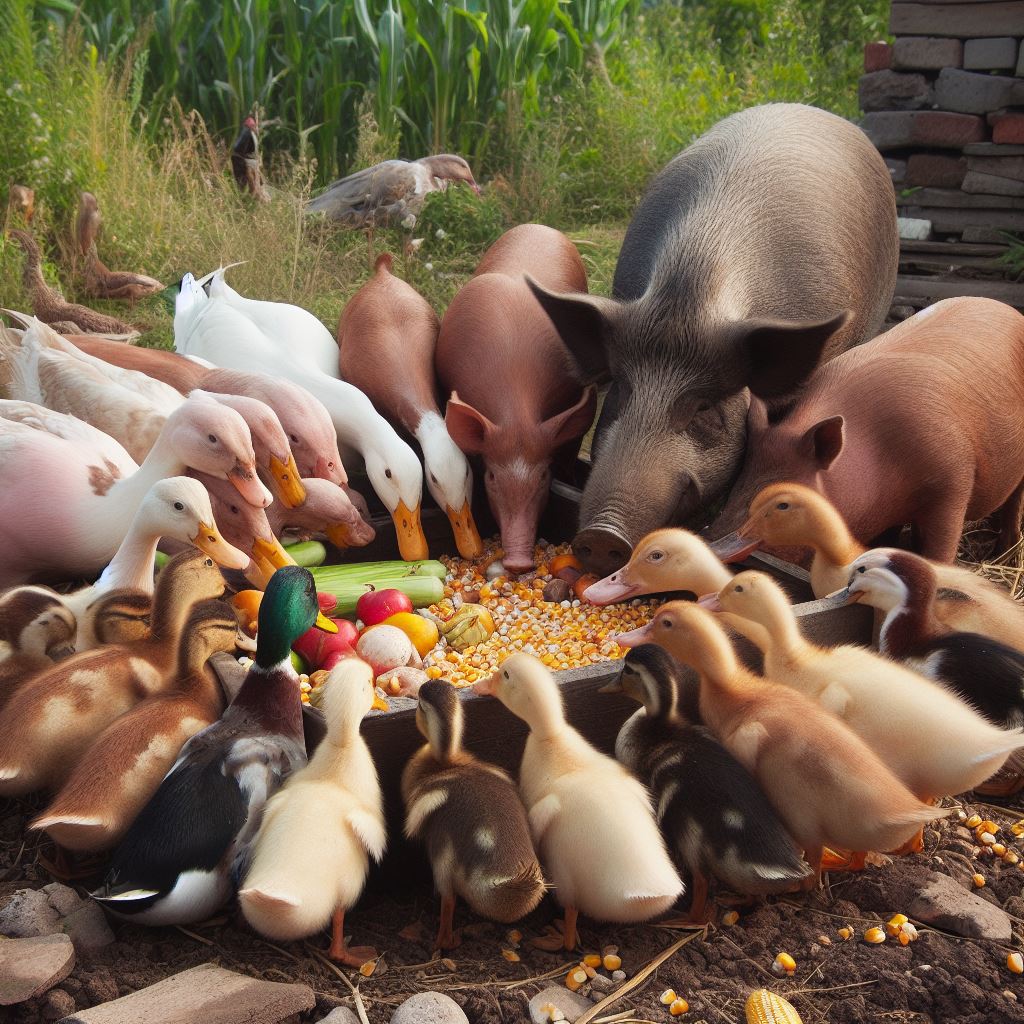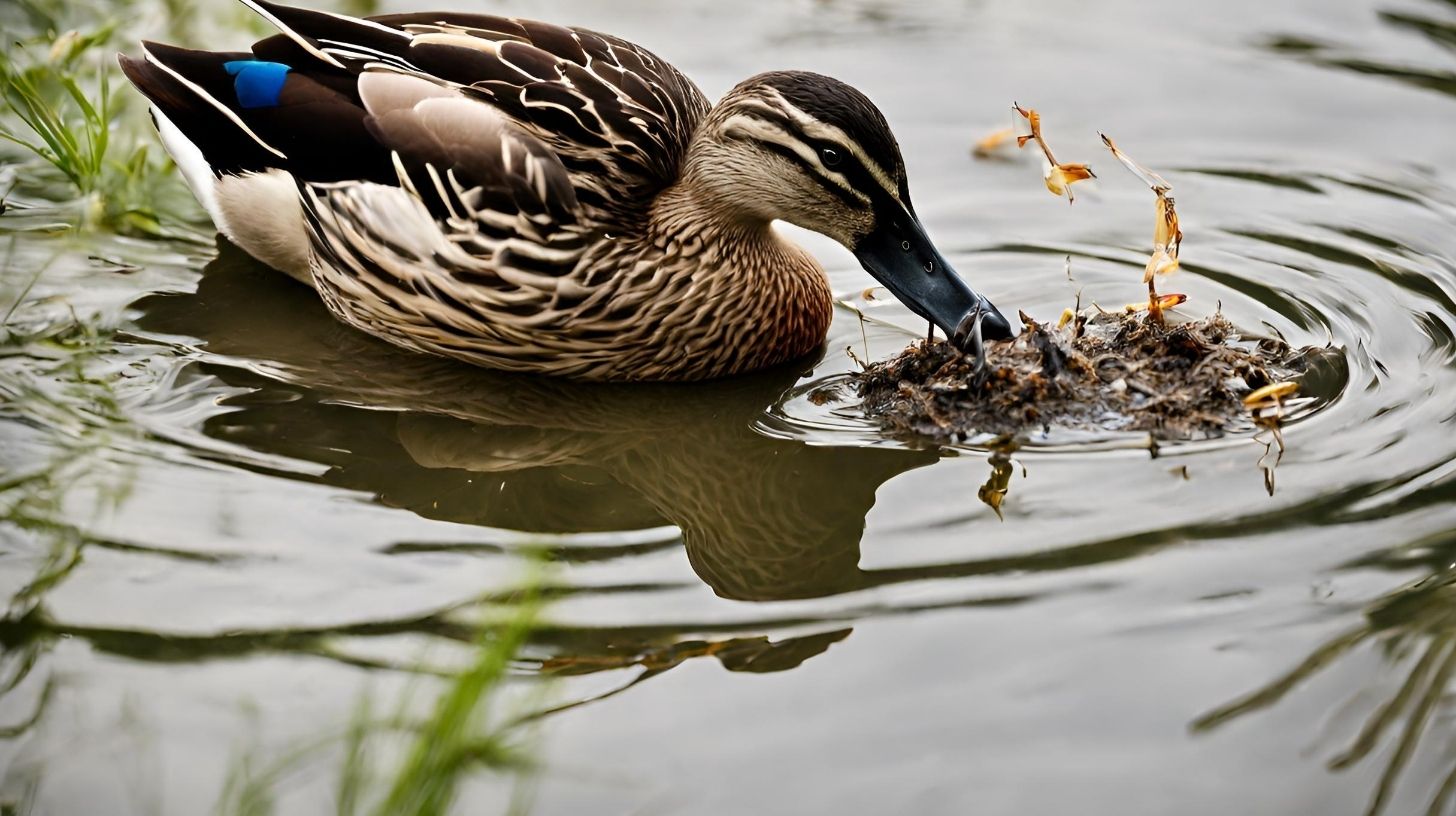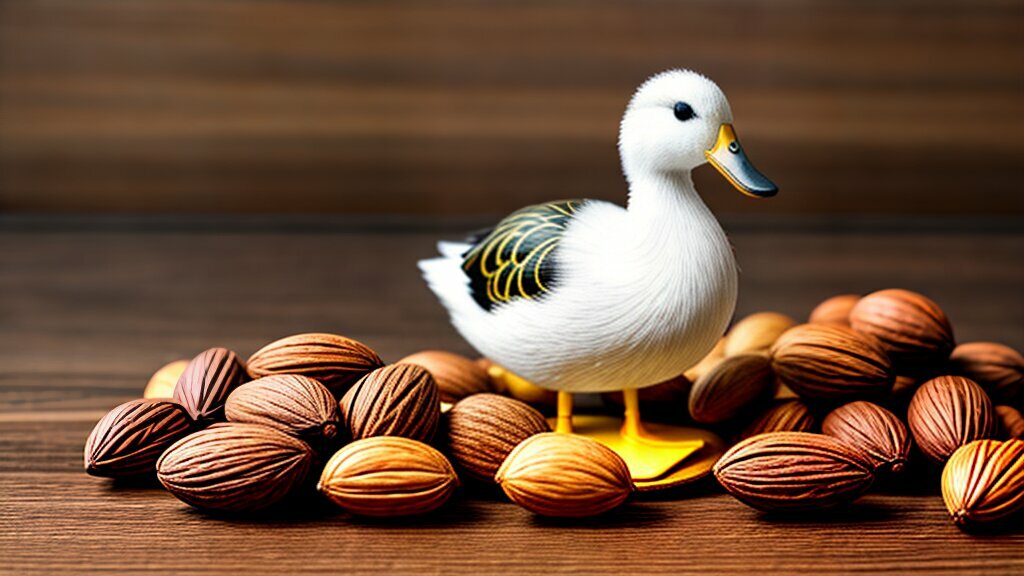Can Ducks Eat Pig Feed? Benefits and Precautions

Table of content:
- Ducks’ Dietary Needs
- What’s in Pig Feed?
- Can Ducks Have Pig Feed Occasionally?
- Nutritional Comparison: Pigs Versus Ducks
- Potential Benefits of Pig Feed for Ducks
- Health Risks of Feeding Ducks Pig Feed
- Feeding Pig Feed to Ducklings
- Can Ducks Eat Layer Pig Feed?
- Frequently Asked Questions About Feeding Pig Feed to Ducks
- Can I feed whole pig feed corn to ducks?
- What about feeding ducks food scraps from pigs?
- Is it ok for ducks to eat food made for piglets?
- What are some alternatives to pig feed I can use as duck treats?
- How often should ducks have treats alongside their main feed?
- Can I feed my duck flock a mixture of pig and duck feed?
- Conclusion Ducks Eating Pig Feed
Yes, ducks can eat small amounts of pig feed as an occasional treat, but it should not make up the bulk of their diet.
Ducks make wonderful pets with their cute waddling walks, quacking vocals, and lively personalities. As a duck owner, you want to make sure your feathered friends stay happy and healthy by feeding them an optimal diet.
You may have extra pig feed around and wonder if you can share some with your ducks as an occasional treat. While nutritional needs differ between pigs and ducks, pigs and ducks do have some dietary overlap.
Understanding the similarities and differences in their digestive systems and nutritional requirements will help shed light on whether pig feed makes a suitable supplemental snack for ducks.
Ducks’ Dietary Needs
Domestic ducks have the same nutritional requirements as wild ducks. Their diet should include:
- Protein – Provides amino acids for growth and egg production. Ducklings need 18-20% protein, adults need 14-16%. Good options include insects, fish meal, and legumes.
- Carbohydrates – Needed for energy. Should make up 40-50% of diet from sources like grains.
- Calcium – For bone strength and eggshell quality. Get from oyster shell or limestone grit.
- Niacin – For metabolism. Brewer’s yeast is a good source.
- Vitamin D3 – Needed for calcium absorption. Sunshine provides natural.
- Water – Ducks need lots of fresh water for drinking and grooming.
With their broad nutritional needs in mind, let’s look at pig feed and see how it compares.
What’s in Pig Feed?
While recipes vary across pig feed brands, pig feed typically contains:
- Grains – Corn, wheat, barley, soybeans
- Protein/amino acids – Fish meal, whey, meat meal
- Vitamins and minerals – Vitamins A, D3, E, and B12, calcium, phosphorus
- Energy – Vegetable or animal fat
Pig feed formulas are specially designed to deliver optimal nutrition for swine growth and development. Most pelleted pig feeds contain around 16% protein.
Pig Feed Versus Duck Feed
There are some notable differences between standard duck and pig feeds:
- Protein content – Pig feeds run around 16% protein versus 14-20% in duck feeds.
- Fat content – Pig feeds have higher fat from animal sources than duck feeds.
- Fiber content – Ducks need more fiber than pigs.
- Vitamins/minerals – Ducks need more niacin and calcium than pigs.
So pig feed is relatively high in protein and fat compared to the optimum diet for ducks. The lower fiber content is another difference.
 Can Ducks Have Pig Feed Occasionally?
Can Ducks Have Pig Feed Occasionally?
While pig feed isn’t perfectly aligned with duck nutritional requirements, ducks can eat small amounts of standard pelleted pig feed as an occasional treat without issues.
Here are some tips on how to integrate pig feed as a supplemental snack for ducks:
- Limit to small portions – No more than 1/4 cup of pellets per duck per day.
- Feed intermittently, not daily – Offer pig feed as a snack a couple times a week at most. Vary with treats like vegetable scraps, bird seed, livestock grain, greens, or insects.
- Ensure main diet is duck-appropriate – Make sure the bulk of diet comes from a complete duck feed or ration balanced for ducks.
- Avoid medicated pig feed – Medicated swine feed could have negative health impacts. Check labels and don’t feed medicated varieties.
- Watch for changes in droppings – Loose droppings can indicate an imbalance. Stop feeding if this occurs.
- Introduce new feeds slowly – Mix small amounts of new feeds in with regular diet at first to allow ducks’ digestive systems to adjust.
With proper precautions, pig pellets can be integrated as an occasional supplemental feed for ducks looking for some treat variety.
Nutritional Comparison: Pigs Versus Ducks
Let’s take a more in-depth look at the nutritional differences and similarities of ducks and pigs:
| Nutrient | Pig Requirement | Duck Requirement |
|---|---|---|
| Protein | 14-18% of diet | 14-20% of diet (higher for ducklings) |
| Fat | 5-8% of diet | Lower fat needs than pigs |
| Linoleic acid | 1% of diet | Not specified |
| Calcium | 0.6-1.3% | 1.2-2% of diet |
| Phosphorus | 0.30-0.80% | 0.5-1% of diet |
| Sodium | 0.18-0.28% | 0.18-0.75% |
| Chlorine | 0.14-0.28% | Not specified |
| Potassium | 0.5-1.1% | 0.4-0.7% |
| Magnesium | 0.04-0.06% | 0.025% |
| Iron | 80-150 ppm | Not specified |
| Zinc | 50-125 ppm | 40 ppm |
| Manganese | 2-8 ppm | 20-40 ppm |
| Copper | 5-20 ppm | 4-8 ppm |
| Iodine | 0.14-0.5 ppm | 0.35 ppm |
| Selenium | 0.1-0.3 ppm | 0.1 ppm |
Key Similarities
Pigs and ducks share some key nutritional needs:
- Protein content – Both require feed with 14% protein or higher.
- Amino acids – Requirements are similar for lysine, methionine, tryptophan, threonine.
- Vitamin needs – Both need vitamins A, D3, E, and B vitamins like riboflavin and B12.
Key Differences
Some important nutritional differences to note:
- Fat content – Pigs need more fat than ducks.
- Calcium content – Ducks need higher calcium for eggshell strength.
- Niacin – Ducks require more niacin than pigs.
- Fiber – Ducks utilize more fiber than pigs. Pigs can’t digest fiber well.
So while pig and duck nutrition overlaps in some areas, there are distinct differences to consider when supplementing ducks with pig feed.
Potential Benefits of Pig Feed for Ducks
Here are some potential benefits of pig feed for duck health:
- Supplemental protein – The slightly higher protein content of pig feed can help enhance protein intake for ducks’ growth and egg production.
- Amino acid balance – The amino acid balance supports ducks’ needs.
- Energy – The extra fat and carbohydrates provide supplemental energy.
- Palatability – Many ducks seem to relish the taste of pig pellets as a treat.
- Convenience – Pig feed offers an easy alternative treat if you have it on hand for other livestock.
- Variety – The pellets add variety alongside regular duck feed and treats.
The key is feeding pig food in moderation to prevent nutritional imbalances. When included occasionally in small portions, it can provide a strong supplemental nutritional boost ducks enjoy.
Health Risks of Feeding Ducks Pig Feed
While small portions of pig feed are fine as an occasional snack, there are some potential health risks to be aware of if too much pig feed is fed over extended periods:
- Excess protein – Excess levels could tax the liver and kidneys and lead to gout.
- Fat levels – Too much fat could cause obesity and liver problems.
- Calcium deficiency – Not enough calcium could cause issues like egg binding or brittle bones.
- Nutritional imbalances – Too much pig feed could lead to imbalances and vitamin/mineral deficiencies.
- Digestive upset – Too much pig feed could cause loose droppings or diarrhea from excess fat, protein, or lack of fiber.
- Weight gain – The higher calories could lead to obesity.
- Medications – Medicated pig feed could cause toxicity.
Moderation is key when feeding any treat. When ducks get the bulk of their nutrition from quality duck feed and enjoy pig pellets as an occasional snack, the health risks are low. However, overdoing pig feed in the diet could result in the issues above.
Feeding Pig Feed to Ducklings
Growing ducklings have some unique nutritional needs, including higher protein requirements. Can ducklings eat pig starter feed? Here are some tips:
- Wait until fully feathered – Feed commercial duckling starter formula initially. Introduce pig pellets after 4-6 weeks once fully feathered.
- Small portions – Feed just a few pellets per day to try initially.
- Monitor weight – Weigh often and adjust portions to avoid excess weight gain.
- Ensure proper nutrition – Pig pellets should supplement a duckling starter feed, not replace it.
- Avoid medicated feed – Don’t give medicated options; read labels.
The higher fat and protein levels of pig starter feeds are too rich for very young ducklings in large amounts. But ducklings over 4-6 weeks can sample plain pig starter feeds in moderation. As always, proper duckling nutrition remains key.
Can Ducks Eat Layer Pig Feed?
Layer pig feeds are formulated to meet the higher calcium needs of breeding pigs. The calcium levels are actually pretty aligned with the higher calcium requirements of egg-laying ducks.
Here are some tips on feeding layer pig feeds to ducks:
- Good occasional treat – The extra calcium makes it suitable as a periodic treat for laying ducks.
- Not a complete diet – Should still only supplement a complete laying duck ration.
- Higher calcium not needed for non-layers – Only provide layer feed to mature, laying ducks. Younger or male ducks don’t need the extra calcium.
- Still limit portions – Feed layer pig feed intermittently in quantities of 1/4 cup or less per duck.
The calcium and protein levels make layer pig feeds one of the better options for occasional supplemental feeding for ducks. But a proper duck layer feed should still provide the bulk of nutrition.
Frequently Asked Questions About Feeding Pig Feed to Ducks
Can I feed whole pig feed corn to ducks?
Whole corn is relatively low in protein and calcium for ducks’ needs but high in carbohydrates. It makes a nice occasional treat in small portions if ducks are getting a balanced diet otherwise. Limit it to a handful per duck a couple times a week.
What about feeding ducks food scraps from pigs?
Leftover scraps from pigs like vegetables, fruits, grains, and even small amounts of meat scraps are usually fine as supplemental treats in moderation. But don’t overdo higher fat/protein foods.
Is it ok for ducks to eat food made for piglets?
Young piglets do well on starter feeds with 20% protein or more. This is also suitable for ducklings over 4-6 weeks old. But medicated piglet starter should be avoided, and duckling starter feeds are still recommended as the bulk of the diet.
What are some alternatives to pig feed I can use as duck treats?
Some healthy options are bird seed, chopped greens, vegetable/fruit scraps, freeze-dried insects like mealworms, and livestock grain mixes. Rotate diverse treats to give ducks variety.
How often should ducks have treats alongside their main feed?
Aim for a couple treat sessions 2-3 times per week at most. Daily treats are not necessary and may lead to an unbalanced diet. Moderation is key.
Can I feed my duck flock a mixture of pig and duck feed?
It’s best to avoid routinely mixing pig and duck feed. Feed quality duck feed as their dietary base, and use pig pellets as a supplemental snack a couple times a week only.
Conclusion Ducks Eating Pig Feed
While their nutritional needs differ in some respects, ducks can eat small portions of standard pig finishing feeds as an occasional treat.
Focus on proper duck nutrition through quality complete feeds, and enjoy pig pellets as a snack a couple times a week at most.
Limit portions to 1/4 cup or less per duck. Avoid overdoing it, and don’t feed medicated swine feeds. Include a variety of treats in moderation for the happiest, healthiest ducks.
With some common sense precautions, pig feed can be integrated as one option in a balanced, diverse supplemental feeding regimen ducks will enjoy.
Welcome. I’m Adreena Shanum, the proud owner of this website, and I am incredibly passionate about animals, especially poultry. I founded adreenapets.com as a labor of love, stemming from my desire to share my knowledge and experiences with poultry enthusiasts worldwide.




